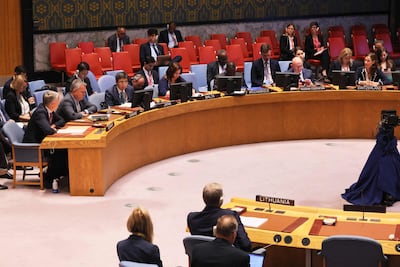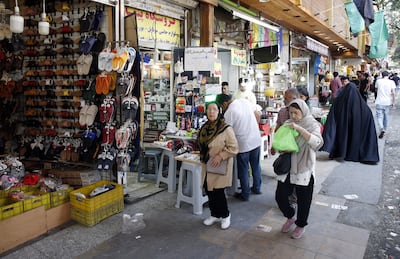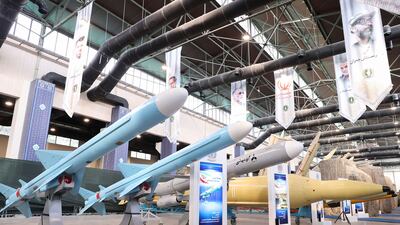A two-year clock is ticking until Iran achieves its goal of ending UN scrutiny of its nuclear activities, after European governments moved to bring sanctions in-house.
Britain, France and Germany announced that UN sanctions set to expire on October 18 would be maintained in domestic law because of Iran's “consistent and severe non-compliance” with nuclear limits.
But they stopped short of invoking a “snapback” that would tear up negotiations with Tehran by reinstating old UN sanctions. The option to do that expires in October 2025, as agreed to in the 2015 Iran nuclear deal.
On the same date the UN Security Council “will have concluded its consideration of the Iranian nuclear issue” unless a snapback is triggered before then.
This “de-securitisation” matters to Iran because expired UN sanctions are unlikely to be reinstated given Russia and China's veto power in the council, said Hamidreza Azizi, an expert on Iran at the German Institute for International and Security Affairs.
Iranian diplomats “think that time is on their side”, he told The National.
“Once the snapback is gone, that’s a point of no return so there won’t be any securitisation possible. That’s why this is very important to Iran. It’s beyond symbolic, there’s an actual concrete element to it.”
Under the rules in place until 2025, the snapback can be invoked unilaterally by parties to the nuclear deal, who include Britain, France and Russia.
However, European powers are likely to hold fire unless Iran enriches uranium to a weapons-grade 90 per cent, said Jason Brodsky, policy director of the United Against Nuclear Iran lobby group.

The US could also attempt to use the snapback, although there are doubts about whether this is valid given its withdrawal from the nuclear deal under Donald Trump's presidency in 2018.
A US snapback would also set back tentative diplomatic efforts with Iran which have recently brought home American prisoners – meaning it is unlikely to be considered until at least after the 2024 presidential election, said Dr Azizi.
Deal hopes dashed
The hope under the original deal was that by 2025, Tehran would have complied with limits on its uranium enrichment and inspectors could verify that a nuclear-armed Iran was a distant prospect.
Iran was granted sanctions relief as an incentive to comply.
However, the US withdrawal prompted Iran to retaliate by enriching uranium to 60 per cent, a level which western powers say has no credible civilian purpose and is only a short step from a bomb.
The rebadged sanctions on Iran's nuclear, missile and weapons programmes came in a week when the UN made clear its disappointment that Iran has failed to explain mysterious atomic traces at two sites.
The UN’s International Atomic Energy Agency says it cannot verify whether Iran’s intentions are peaceful until the presence of uranium is cleared up.
Efforts to revive the original deal – formally known as the Joint Comprehensive Plan of Action – have stalled amid tension over Russia's invasion of Ukraine, Iran's links to the conflict and its repression of domestic protest after the death of 22-year-old Mahsa Amini a year ago on Saturday.
The UK, US, Canada and Australia announced new sanctions related to Iranian domestic repression on Friday, targeting the mayor of Tehran and others allegedly involved in enforcing strict dress codes on women. The EU's top diplomat Josep Borrell said on Friday the human rights situation in Iran “continues to be critical”.
Iran hit back at the announcement on rehoming UN sanctions by saying it “creates tension and is accompanied by malicious intentions”.
On the nuclear front, however, European powers say they remain open to talks even as they accuse Iran of “refusing opportunities” to return to the deal.
Iran's uranium stockpile is now 18 times greater than what was envisaged under the deal, according to the three European countries, and western diplomats are concerned that its scientists have made irreversible gains in nuclear know-how.

With prospects apparently gloomy of restoring the full deal, Dr Azizi said diplomats could turn to informal or “less-for-less” arrangements in which they seek partial limits on Iran in return for certain concessions.
He suggested this could include Iran respecting a 20 per cent enrichment limit, rather than the 3.67 per cent in the original deal. In return, the US could tolerate some Iranian oil sales to countries such as China.
The recent prisoner exchange – criticised by some former detainees in Iran – could be seen as a sign of “testing the waters”, he said.
Some bilateral restrictions such as those now being introduced in Europe would likely remain even if the UN regime collapsed, but Iran “has started to care less and less, I think, about the western sanctions”, Dr Azizi said.
“The main restrictions against Iran’s development and transfer of missiles, drones and so on are those related to the US and Europe, and they are going to remain in place.
“But it’s a matter of legitimacy first, and secondly, more importantly, it relates to Iran’s desire to gradually bring its case out of the consideration of the UN Security Council.”


